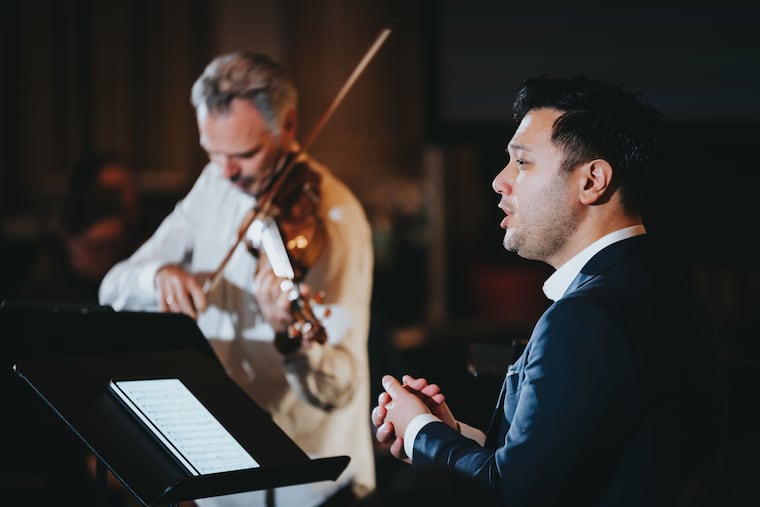PCMS ‘Emerging Voices’ ends with a big American bang, including new songs from Nico Muhly
All of the programs explored key points leading up to and coming out of World War I — through the relatively unimposing but bold personal lens of art song.

The conclusion of a musical odyssey can’t help but have its own mixture of exaltation, relief, and maybe incredulity over the size of the accomplishment — which was palpably the case when Philadelphia Chamber Music Society wrapped up its two-week, six-concert Emerging Voices: Art Song & Social Connection project.
The final concert on Friday at the Kimmel Center’s Perelman Theater was among the most ambitious — titled The Rise of the American Voice — with the project’s curator/tenor Nicholas Phan premiering a new work by Nico Muhly (known both for commissions by the Philadelphia Orchestra and Metropolitan Opera) amid a shifting cast of singers, including Corinne Winters. She stepped in with much unfamiliar repertoire after Melody Moore stepped out.
All of the programs explored key points leading up to and coming out of World War I — through the relatively unimposing but bold personal lens of art song. Friday’s program charted a fascinating artistic progression, starting with an America that lacked a distinctive identity in classical music until the 1930s, even though our country’s writers and poets were establishing themselves a good century before. That explains why art songs by Virgil Thomson, Howard Swanson and Margaret Bonds were mainly literary showcases for the likes of Langston Hughes, Robert Frost and Emily Dickinson. Even though Aaron Copland was a fully matured composer when he wrote his Twelve Poems of Emily Dickinson in 1950, he hid his own voice behind the poet’s.
Many of these composers weren’t big on pathos. In the 1959 Mostly About Love, Thomson still maintained an ironic sense of reserve with Kenneth Koch’s playful text, even with such proclamations as “I’m crazier than a shirttail in the wind.” Swanson made welcome but sparing use of blue notes in “A Death Song.” Elliott Carter’s Three Poems of Robert Frost (1943) had verses with quirky turns, to which he added a few of his own quirks, reminding you that this fledgling modernist icon had an ebullient sense of humor.
Where the concert became magical — and I don’t use that word lightly — was in the three newer pieces. Tania Leon’s 1994 “Oh Yemanja” (Mother’s Prayer) had free-floating imagery by Wole Soyinka, with beautifully molded vocal lines accompanied by haiku-like musical gestures by cello and piano. Caroline Shaw’s 2019 “And So” had the kind of vocal lines that could have been written only by a singer (which she is), with self-authored texts riffing on Gertrude Stein’s famous “A rose is a rose” quotation. In contrast to previous generations, Shaw was emotionally forthright, conveying great longing, some bitterness, and much in between. That piece, in an excellent performance by Winters and the Brooklyn Rider string quartet, rightly had the strongest audience reaction of the concert.
Titled Strangers, the new Muhly song cycle (commissioned by PCMS) showed the art-song medium at its agile best. Addressing current issues around immigration, Muhly chose prose texts quoting letters from the 19th and early 20th centuries as well as the morality-steeped Book of Leviticus, dealing with the racism inflicted on the Chinese in America as a case in point. In the tradition of word-dominated songs, Muhly showcased some fairly volatile ideas with vocal lines fashioned with clear, unheated rhetoric — all buoyed by string quartet accompaniment full of post-minimalist arpeggios. Muhly is usually impressive, but this is a piece you can take to your heart, especially in the well-studied, beautifully polished performance by Brooklyn Rider and Phan at his articulate best. At times, I do believe he is a great singer.
You can’t always count on polish in an entire program of little-known music, but the performances consistently projected poise and understanding — including Winters, Sarah Shafer, Douglas Williams plus pianists Myra Huang and Shannon McGinnis. Any mention of video in concert settings can strike terror in the hearts of Philadelphia concertgoers. We’ve seen it done so badly, so often. But the atmospheric videos on Friday by Hana Kim reflected great sympathy toward the music. Just as important, the projection technology on a 30-foot screen allowed a palette of colors as rich as the music itself.